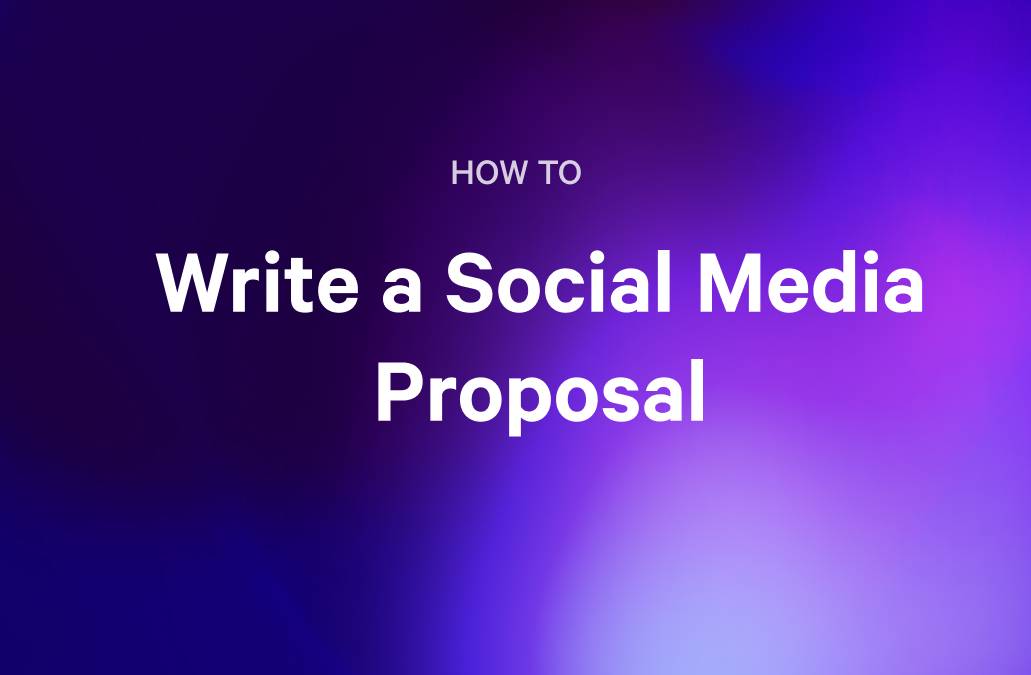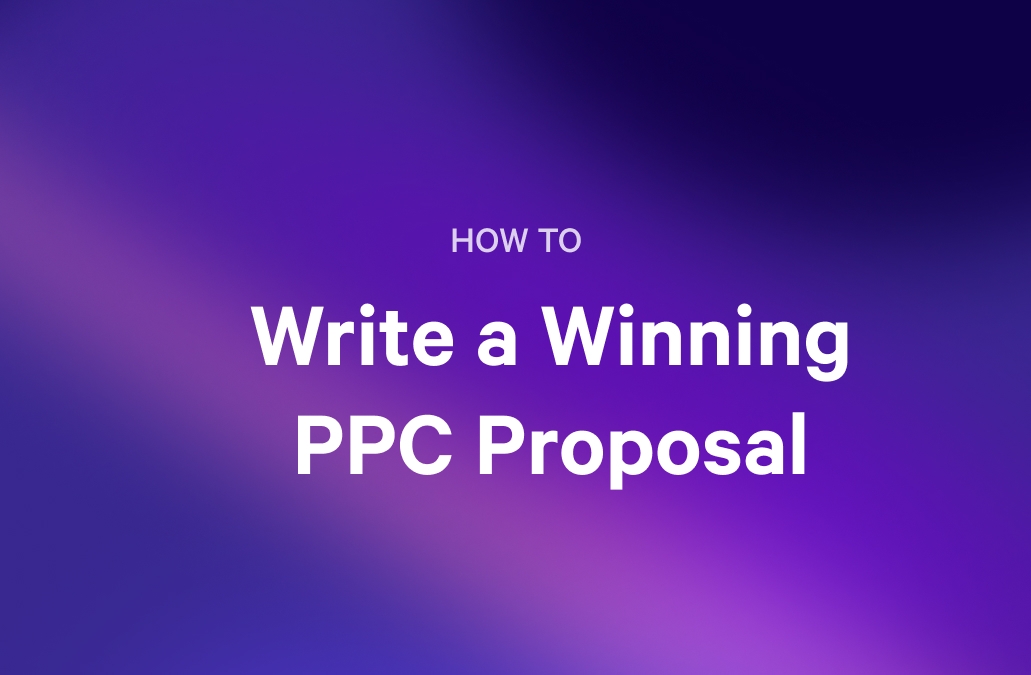Social media consulting proposals are a unique blend of art and science. Clients demand innovative ideas that captivate and engage, underpinned by cold hard metrics. It's no longer enough to have friends and followers; savvy prospects are looking for tactics that convert.
Telling a compelling story about how you'll provide social media consulting services is the first step in winning new business.
What is a social media consulting proposal?
A social media consulting proposal outlines how you plan to guide a client through the complexities of social media strategies, platform optimization, and audience targeting. This proposal emphasizes strategic guidance over daily management tasks and focuses on three key aspects:
1. Understanding the client’s needs
Begin by providing a detailed analysis of the client's current social media strategy and performance. Highlight gaps, areas for improvement, and opportunities. This step is crucial for setting the stage for your consulting recommendation, as well as understanding the broader business objectives and how they translate into social media goals.
2. Proposing customized solutions
Based on your analysis, propose strategic solutions tailored to the client’s specific challenges and objectives. This could involve suggesting new platforms to target, outlining a content strategy that differentiates the brand, or proposing the use of advanced analytics tools to better understand audience behavior. Demonstrate your expertise by suggesting innovative approaches that leverage the latest trends and technologies in social media.
3. Expected outcomes and metrics
Clearly define what success will look like with your proposed strategy, outlining the key performance indicators (KPIs) you will use to measure effectiveness. This might include increases in engagement rates, growth in follower base, improvements in brand sentiment, or more direct measures such as leads generated or conversion rates. Ensure these metrics align with the client's overarching business goals, providing a roadmap for how your consulting efforts will contribute to their success.
Steps to write a social media consulting proposal: Key elements to include
Your proposal requires a narrative that really hits home with your prospective clients. It’s showing them, in no uncertain terms, that you not only understand them but have the strategy (and experience) to get them where they need to be. These are the key elements to include:
Executive Summary
- The executive summary is the gateway to your proposal, aiming to capture the client’s attention. In this section, you’ll provide a snapshot of your unique, transformative strategy, directly aligning it with the client’s goals.
- This is your chance to make a strong first impression, so emphasize the benefits of your services with persuasive language. This will set the stage for the detailed strategy that will follow.
Goals and Objectives
- Here, you lay the groundwork, clearly defining what the client aims to achieve through social media efforts. Start by discussing the broader objectives, such as increasing brand awareness, driving traffic to their website, or even conversions.
- Specify these goals in measurable terms, i.e., a 20% increase in follower engagement or 50 new leads per month.
- Then, tie in these objectives to tangible business outcomes (such as enhanced customer loyalty or improved sales conversions), demonstrating your understanding of how social media can impact the client's overall business performance.
Audience Analysis
- In this section, demonstrate your deep understanding of the client's target market by dissecting their potential customers' demographics, interests, and online behaviors. Begin with a detailed breakdown of the audience’s age, gender, geographic location, and other relevant factors.
- Discuss their preferred social media platforms and peak activity times, which will inform where and when to publish content for maximum engagement.
- Use this analysis to justify strategic choices in platform selection and content scheduling, ensuring your proposal is backed by data-driven insights.
Strategy and Tactics
- Outline the strategic use of various social media platforms tailored to the client's goals and audience. Specify why certain platforms like Facebook, Instagram, or LinkedIn are chosen based on their reach and relevance.
- Discuss your content strategy in detail—types of posts, posting frequency, and thematic focus—emphasizing how these elements will engage the target audience effectively.
- This section should also detail the integration of organic and paid strategies to maximize reach and impact, providing a holistic view of potential growth tactics.
Timeline
- Detail the timeline of your consulting project starting with an initial analysis phase where you assess the current social media status and strategize accordingly. This might include setting up necessary tools and aligning with the client’s marketing calendar.
- Follow this with a strategic execution phase, outlined in monthly or bi-weekly segments, which allows for iterative adjustments based on performance analytics.
- Conclude with a review and optimization phase, where you evaluate the strategy against the agreed KPIs, discussing these in scheduled reviews to refine and pivot the strategy as necessary.
Budget
- Provide a transparent budget, broken down by category: strategic planning, content guidance, paid advertising, and any other consultancy fees.
- Explain each cost element in detail, ensuring the client understands the value and expected ROI of each investment.
- Discuss potential scenarios for cost adjustments based on campaign performance or strategic shifts.
KPIs and Reporting
- Clearly define the KPIs that will measure the success of the implemented strategies, such as engagement rates, follower growth, and conversion metrics.
- Explain your reporting methodology, the frequency of updates, and the formats used (e.g., dashboards, written reports).
- Highlight how ongoing analysis will guide future strategy adjustments, ensuring continuous optimization and alignment with the client’s business objectives.
Case Studies and Testimonials
- Hopefully, by now, you’ve sold them on your strategy and skills! It's time to get your proposal over the finish line, and nothing reassures like social proof. Start by selecting relevant examples that showcase successful outcomes from past campaigns. For each case study, provide a brief overview of the client's initial challenges and the specific goals they aimed to achieve.
- Detail the strategies implemented to address these challenges and the results obtained. Include quantitative data, such as percentage increases in engagement, follower counts, or conversion rates, to substantiate your claims.
- Highlight any notable innovations or tactics that contributed to the success, such as a particularly effective ad campaign or a viral content piece.
- In addition to case studies, include testimonials from past clients praising your services, as well as the tangible benefits they've experienced from your partnership. These should be short, impactful, and directly related to the aspects of your service you wish to emphasize, such as your strategic thinking, reliability, or creative approach.
Terms and Conditions
- Here, you'll outline your engagement's legal and procedural parameters, ensuring both parties have clear expectations and protections. Begin by specifying the duration of the contract, including any key dates for project milestones and deadlines.
- Clarify the scope of services, detailing what is included in your social media consulting package and any services that might be considered outside of this scope.
- Discuss payment terms, such as payment schedules, acceptable payment methods, and any deposits required before work begins. Include confidentiality, intellectual property, and data protection clauses that protect both your business strategies and your client's sensitive information.
- Clarify the ownership of any content or tools developed during the engagement, detailing the rights of each party to use this content after the consultancy period has ended.
- Finally, provide information on the cancellation policy, outlining how either party can terminate the agreement if necessary, including any notice periods and financial implications of early termination.
Example of a social media consulting proposal template
For a better idea of what this all looks like in more practical terms, here’s a social media consulting proposal template:
Executive Summary
Consultancy Name: [Your Consultancy Name]
Proposal Prepared for: [Client's Company Name]
Date: [Date]
This proposal is prepared for [Client's Company Name] to outline the strategic approach [Your Consultancy Name] will employ to enhance your social media efforts. Our goal is to leverage our expertise in social media strategy to significantly improve your engagement, brand presence, and, ultimately, your business outcomes.
Understanding Your Needs
Our initial assessments indicate that your current social media strategy could be enhanced to better meet your goals of [specific client goals, e.g., increasing brand awareness, boosting sales, etc.]. We have identified several opportunities to optimize your social media channels and tactics to reach these objectives.
Proposed Strategic Solutions
1. Platform Optimization: Focusing on [specific platforms] to better reach your target demographic.
2. Content Strategy Revamp: Develop a content calendar that aligns with your brand’s message and audience interests.
3. Engagement Tactics: Implementing engagement strategies such as interactive posts, live sessions, and community-building activities.
4. Analytics and Adjustments: Utilizing advanced analytics to track performance and make data-driven adjustments.
Expected Outcomes and Metrics
Our strategy aims to achieve:
- A [specific percentage] increase in engagement within the first three months.
- Growth in follower count by [specific number] within six months.
- Higher conversion rates from social media leads by [specific percentage].
We will measure success using KPIs such as engagement rate, follower growth, and conversion rates.
Case Studies and Testimonials
Case Study 1: [Brief overview of the client, challenge, strategy implemented, and results achieved, including specific metrics].
Testimonial: "Working with [Your Consultancy Name] provided us with strategic insights that transformed our social media presence." - [Previous Client Name, Position, Company]
Terms and Conditions
- Duration of Engagement: The proposed timeline for this project is [start date] to [end date].
- Scope of Services: Includes strategy development, periodic reviews, and ongoing strategy adjustments. Does not include daily content management or direct community engagement.
- Payment Terms: Payments will be due on a monthly basis, with the first installment due upon contract signing.
- Confidentiality and Data Protection: Both parties agree to maintain confidentiality regarding any proprietary information exchanged during the consultation.
- Cancellation Policy: Either party may terminate the contract with a 30-day written notice. Any prepaid fees for services not yet rendered will be refunded.
Conclusion
We are excited about the possibility of working with [Client's Company Name] and are confident in our ability to drive meaningful results through strategic social media consulting. We look forward to discussing this proposal further and answering any questions you might have.
Contact Information
Consultant Name: [Your Name]
Email: [Your Email]
Phone Number: [Your Phone Number]
Qwilr’s Social Media Consulting templates {insert link} help you make interactive, easily customizable, and visually impressive proposals in a fraction of the time. Or check out our proposal generator software for free to create your own.
Final Thoughts
Take the time to truly understand your client’s needs, then tailor your innovative solutions to those needs. Nail that, and you’ll go a long way to establishing yourself as the perfect partner for any prospective social media client.
We hope this guide has helped, and if you need a little more, why not try our Social Media Consulting template? Impactful presentations that win business in a fraction of the time.
About the author

Brendan Connaughton|Head of Growth Marketing
Brendan heads up growth marketing and demand generation at Qwilr, overseeing performance marketing, SEO, and lifecycle initiatives. Brendan has been instrumental in developing go-to-market functions for a number of high-growth startups and challenger brands.
Frequently asked questions
The best format is clear, concise, and visually appealing. Use headings, bullet points, and tables to organize information. Include graphs or infographics to illustrate key points like growth projections or audience demographics. Remember, your proposal should not only inform but also engage the reader.
Absolutely! But customize it for each client to reflect their unique needs and objectives. A tailored proposal shows that you’ve done your homework and are genuinely interested in their very specific challenges and goals.


